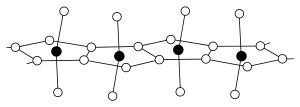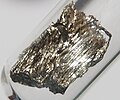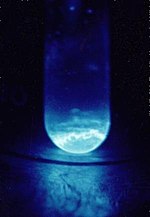Protactinium(V) iodide is an inorganic compound, with the chemical formula of PaI5. It can be prepared by the reaction of metals protactinium and iodine...
4 KB (308 words) - 12:42, 5 January 2024
with AlO3 at 600 °C. Protactinium(III) iodide can be obtained by heating protactinium(V) iodide in vacuum. As with oxides, protactinium forms mixed halides...
50 KB (5,824 words) - 02:54, 13 July 2024
for protactinium(V) iodide. The protactinium coordination in all its tetrahalides is 8, but the arrangement is square antiprismatic in protactinium(IV)...
17 KB (1,760 words) - 20:03, 12 May 2024
Protactinium(V) fluoride is a fluoride of protactinium with the chemical formula PaF5. Protactinium(V) fluoride can be obtained by reacting protactinium(V)...
4 KB (377 words) - 20:06, 12 May 2024
Protactinium(V) bromide is an inorganic compound. It is a halide of protactinium, consisting of protactinium and bromine. It is radioactive and has a chemical...
4 KB (409 words) - 20:05, 12 May 2024
3PaI5 + Al → 3PaI4 + AlI3 Also, a reaction of hydrogen reduction of protactinium(V) iodide at 400 °C: 2PaI5 + H2 → 2PaI4 + 2HI The compound forms black or...
4 KB (248 words) - 18:43, 12 May 2024
Aristid von Grosse (redirect from Aristid V. Grosse)
1927 to isolate protactinium(V) oxide and was later able to produce metallic protactinium by decomposition of protactinium(V) iodide. From 1948 to 1969...
4 KB (286 words) - 20:30, 11 July 2024
Protactinium(V) chloride is the chemical compound composed of protactinium and chlorine with the formula PaCl5. It forms yellow monoclinic crystals and...
4 KB (175 words) - 12:41, 5 January 2024
List of CAS numbers by chemical compound (section V)
glossary of chemical formulae. Contents A B C D E F G H I K L M N O P R S T U V W X Y Z See also External links Chemistry portal "Nitrogen" (PDF). Safety...
139 KB (120 words) - 17:07, 15 July 2024
Van Arkel–de Boer process (redirect from Iodide process)
The van Arkel–de Boer process, also known as the iodide process or crystal-bar process, was the first industrial process for the commercial production...
3 KB (365 words) - 18:14, 13 June 2024
Iodine compounds (section Hydrogen iodide)
maximum known being in the pentaiodides of niobium, tantalum, and protactinium. Iodides can be made by reaction of an element or its oxide, hydroxide, or...
30 KB (3,546 words) - 15:26, 10 July 2024
Iodine (section Hydrogen iodide)
maximum known being in the pentaiodides of niobium, tantalum, and protactinium. Iodides can be made by reaction of an element or its oxide, hydroxide, or...
106 KB (11,790 words) - 10:37, 13 August 2024
solvents. Protactinium exhibits two valence states; the +5 is stable, and the +4 state easily oxidizes to protactinium(V). Thus tetravalent protactinium in solutions...
130 KB (11,602 words) - 15:30, 15 August 2024
fluoride, sodium chloride (common table salt), silver bromide and potassium iodide. The group of halogens is the only periodic table group that contains elements...
52 KB (5,499 words) - 06:28, 7 July 2024
List of inorganic compounds (section V)
fluoride − AmF3 Americium(IV) fluoride − AmF4 Americium(II) iodide − AmI2 Americium(III) iodide − AmI3 Americium dioxide – AmO2 Ammonia – NH3 Ammonium azide...
119 KB (8,729 words) - 06:43, 23 August 2024
Protactinium(IV) bromide is an inorganic compound. It is an actinide halide, composed of protactinium and bromine. It is radioactive, and has the chemical...
3 KB (347 words) - 13:00, 21 December 2023
lattice De Wolff, P. M.; Belov, N. V.; Bertaut, E. F.; Buerger, M. J.; Donnay, J. D. H.; Fischer, W.; Hahn, Th.; Koptsik, V. A.; MacKay, A. L.; Wondratschek...
49 KB (3,620 words) - 04:18, 28 May 2024
Protactinium(IV) chloride is an inorganic compound. It is an actinide halide, a salt composed of protactinium and chlorine. It is radioactive, and has...
4 KB (357 words) - 19:05, 2 April 2024
are so much smaller than the iodide ions that the lithium fits into holes within the crystal lattice, allowing the iodide ions to touch. That is, the distance...
26 KB (1,723 words) - 11:41, 10 April 2024
Uranium (redirect from Uranium(V) iodide)
primarily undergo alpha decay, except for 229U and 231U, which decay to protactinium isotopes via positron emission and electron capture, respectively; the...
110 KB (12,436 words) - 13:31, 13 August 2024
this behavior is similar to that of neptunium, uranium, thorium and protactinium, but is different from plutonium and curium which show a rapid rise up...
76 KB (9,245 words) - 19:49, 16 August 2024
thallium doping is the sodium iodide and cesium iodide crystals in gamma radiation detection devices. In these, the sodium iodide crystals are doped with a...
52 KB (5,786 words) - 04:05, 9 August 2024
monoxide SmO, monochalcogenides SmS, SmSe and SmTe, as well as samarium(II) iodide. Discovered in 1879 by French chemist Paul-Émile Lecoq de Boisbaudran, samarium...
72 KB (8,229 words) - 17:45, 23 August 2024
phase; such +2 state is not observed in many other actinides, including protactinium, uranium, neptunium, plutonium, curium and berkelium. Einsteinium(II)...
68 KB (8,042 words) - 23:21, 21 August 2024
Group 5 element (redirect from Group V elements)
formation of the metal iodide, in this example vanadium(III) iodide, and the subsequent decomposition to yield pure metal: 2 V + 3 I2 ⇌ 2 VI3 Most vanadium...
80 KB (8,537 words) - 02:13, 19 June 2024
fluoride, chloride, and bromide have the sodium chloride structure, but the iodide has three known stable forms at different temperatures; that at room temperature...
94 KB (11,248 words) - 11:22, 15 August 2024
Extended periodic table (redirect from Eka-protactinium)
to be 3.0 eV, allowing it to form H171, analogous to a hydrogen halide. The 171− ion is expected to be a soft base, comparable to iodide (I−). Element...
148 KB (15,125 words) - 21:17, 22 August 2024
than iodine. Conversely, the bromide ion is a weaker reducing agent than iodide, but a stronger one than chloride. These similarities led to chlorine, bromine...
67 KB (7,693 words) - 20:33, 10 August 2024
Ellis BD, MacDonald CL (2004). "Stabilized Arsenic(I) Iodide: A Ready Source of Arsenic Iodide Fragments and a Useful Reagent for the Generation of Clusters"...
130 KB (14,276 words) - 08:26, 20 August 2024
atomic weight of the component halide increases. Neodymium compounds Protactinium compounds Neptunium compounds Kloprogge 2021, pp. 861–862. Seaborg 1968...
13 KB (1,294 words) - 09:38, 19 June 2024


















